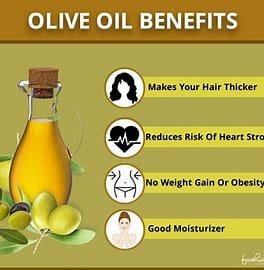Olive oil has been cherished for so long not only by culinary recipes but also for numerous health benefits. Given as one of the staples of the Mediterranean diet, olive oil has been associated with good health and wellness regarding heart health, inflammatory reduction, and weight management. This article tries to illustrate the potential value that olive oil can be used as a good weight-maintenance facilitator, which can activate other positive health aspects within an individual.

Nutritional Profile of Olive Oil
The primary component of olive oil is monounsaturated fats—the type of fat—and is said to be very healthy fat. These fats, especially oleic acid, would reduce inflammation and give considerable benefits to cardiovascular health. Besides this, olive oil has an number of antioxidants, including vitamin E and polyphenols, which fight oxidative stress in the body. The robust flavor and versatility of the olive oil make it an excellent alternative to unhealthy fats like butter and margarine.
Heart Health
The major good effect of olive oil on heart health has been very strongly documented. Studies have shown that the consumption of olive oil reduces levels of bad cholesterol and raises levels of good cholesterol. The two must be held in balance for heart disease to not occur. Research has shown that individuals who consume olive oil are at lower blood pressure levels, improve the functioning of arteries, and risk fewer cases of heart diseases. Health-conscious individuals who desire to maintain healthy weight require heart health since excess weight is a great risk factor for cardiovascular diseases.
Anti-Inflammatory Properties
Most conditions, such as obesity, heart disease, and diabetes, have been associated with chronic inflammation. The relative abundance of polyphenols, particularly oleocanthal, an active principle with similar action to the non-steroidal anti-inflammatory drugs (NSAIDs), makes olive oil anti-inflammatory.
Such an impact would mean that olive oil is able to reduce inflammation that leads to weight gain and, therefore, facilitates weight loss. According to a study published by the Journal of Nutritional Biochemistry, this olive oil-rich diet reduces inflammatory markers. It has good prospects in relation to the management of weight.
Appetite and Satiety Regulation
A key ingredient to weight management success is the ability to suppress hunger while staying satisfied at the same time. The fats in olive oil perform just that. Monounsaturated fats may also provide the sensation of repletion and would prevent binge eating and control hunger; a paper published in Obesity reports that subjects given a rich-fat meal of olive oil described having higher satisfaction rates compared with subjects given a lean-fat meal. This suggests that olive oil may be incorporated into meals to render individuals feel satisfied, thus lowering the chances of grazing and ingesting calories later in the day.
Use of Olive Oil
It is possible to use olive oil in so many different versatile ways in your daily routine. Here are some practical tips on how to use it:
Use it in salad dressings: Simply mix the olive oil with vinegar or lemon juice for a delicious, healthy dressing. This combination is going to enhance your absorption of fat-soluble vitamins from your salad.
Drizzle it on vegetables: Toss vegetables in olive oil before roasting or grilling. This doesn’t only add flavor but also improves the nutrition absorbed by some vegetables.
Cook with it: Use olive oil as a cooking oil for sautéing or frying. Its high smoke point makes it good for different cooking methods, though extra virgin olive oil is best used in low heat applications to preserve its flavor and nutrients.
Dip and Spread: You can use olive oil as a dip for your bread or as a spread for your sandwiches. Pair it with herbs and spices to enhance the flavor and nutrition.
Relation to Mediterranean Diet

The Mediterranean diet is one of the healthiest dietary patterns widely regarded for its emphasis on whole foods, fruits, vegetables, whole grains, fish, and healthy fats, particularly olive oil. Adherence to this diet has been recognized to bring with it reduced rates of obesity, heart disease, and various chronic illnesses. Adopting the Mediterranean lifestyle will not only bring benefits from olive oil but also promote overall health and wellness.
Warning: Quality Counts
With olive oil, choose high-quality EVOO. EVOO extracted from the first cold pressing of olives possesses most of the nutrients and flavor. Choose a bottle that is labeled with “extra virgin” and check the date of harvest to ensure the freshness of the olive oil. A warning to steer clear of the low-grade oils that use additives or contain low levels of beneficial compounds.
Conclusion
The addition of olive oil to the diet will give abundant health benefits, particularly with regard to weight management as well as overall wellness. The heart-healthy fats, anti-inflammatory properties, and the potential to maximize feelings of fullness make it very valuable for inclusion in any meal plan. Incorporating the Mediterranean diet, with proper emphasis on high-quality olive oil, is one of the biggest steps one can take toward remaining at a healthy weight, aside from actually enjoying wonderful and savory food. Be it for cooking, dressings, or as a dip, olive oil is not just a culinary delight but is also a more potent health ally that can make your diet and life much better.




